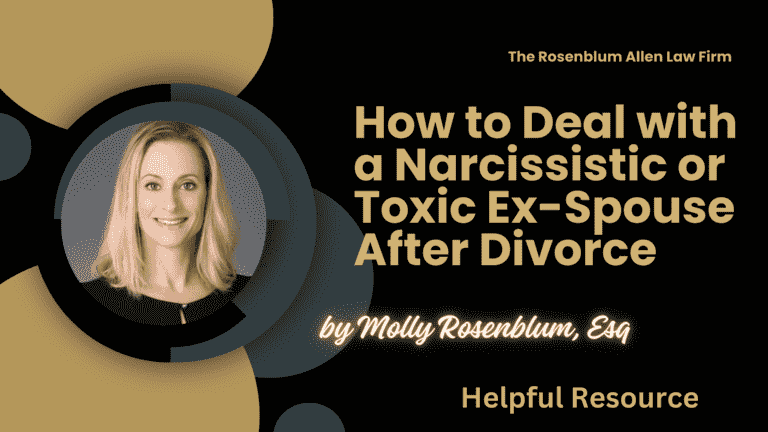
Understanding Narcissism and Its Impact on Divorce
Definition and Characteristics of Narcissism
Narcissism is not just about being self-centered. It’s a psychological condition where a person has an inflated sense of importance, a deep need for excessive attention and admiration, and a lack of empathy for others. Living with a narcissist often means enduring manipulative, controlling, and harmful behavior.Psychological Impacts of Being in a Relationship with a Narcissist
Being married to a narcissist can leave deep emotional scars. You might feel constantly criticized, gaslighted, or emotionally manipulated. This experience often leads to feelings of confusion, low self-esteem, and even depression.How Narcissism Can Complicate the Divorce Process
Narcissists love to win, and they hate to lose. This attitude can lead to lengthy legal battles, unreasonable demands, and an overall challenging and hostile process during a divorce. They might use manipulation tactics or even try to turn mutual friends and family against you.
Legal Considerations in Nevada
Nevada’s approach to divorce might be straightforward, but when a narcissist is involved, expect the unexpected.Overview of Nevada’s Divorce Laws
Nevada is a no-fault divorce state. This means that you can file for divorce without having to prove wrongdoing like adultery or abuse. However, living with a narcissist can add layers of complexity to the process.Special Considerations When Divorcing a Narcissist in Nevada
When divorcing a narcissist in Nevada, be prepared for a potentially prolonged legal battle. Narcissists often refuse to cooperate or try to manipulate the legal system to their advantage. It’s crucial to have a lawyer who understands the nuances of such cases.Protecting Your Rights and Interests During the Divorce
It’s essential to stand firm in protecting your rights. Keep detailed records of all interactions, financial documents, and communication with your spouse. Staying organized and informed will help your legal team advocate effectively for you.Emotional Healing and Support
The journey to emotional recovery after leaving a narcissistic relationship is a winding road filled with ups and downs.The Emotional Journey After Leaving a Narcissistic Relationship
After leaving a narcissist, you might feel a mix of relief and overwhelming emotions. It’s normal to grieve not just the end of the marriage but also the loss of the life you thought you had.Strategies for Emotional Healing and Self-Care
- Therapy: A therapist can provide a safe space to process feelings and offer healing strategies.
- Self-Care: Engage in activities that make you feel good about yourself. It could be as simple as reading a book, walking, or practicing yoga.
- Journaling: Writing down your thoughts can be a powerful tool for healing and understanding your emotions.
Finding Support: Therapy, Support Groups, and Community Resources in Nevada
You’re not alone in this journey. Nevada offers various support groups and community resources tailored to individuals recovering from narcissistic relationships. Therapists specializing in divorce and emotional abuse can provide the professional support you need to move forward. This section provides a foundational understanding and practical advice for those beginning their journey of moving on after divorce from a narcissist in Nevada. The following areas will delve deeper into coping strategies, parenting challenges, financial considerations, and rebuilding relationships.Coping Strategies and Personal Growth
Moving on from a relationship with a narcissist requires resilience and a toolbox of strategies to handle the rollercoaster of emotions.
Developing Coping Mechanisms to Deal with Stress and Manipulation
- Establish Boundaries: Learn to set and maintain clear boundaries with your ex-spouse. This is crucial for minimizing stress and avoiding manipulation.
- Mindfulness and Relaxation Techniques: Meditation and deep breathing can help manage stress and maintain emotional balance.
- Stay Connected with Loved Ones: Lean on friends and family for emotional support. Sometimes, just talking about your day can alleviate stress.
Rebuilding Self-Esteem and Confidence Post-Divorce
A narcissistic relationship can take a toll on your self-esteem. It’s time to rebuild your sense of self-worth.
- Celebrate Small Achievements: Set small, achievable goals and celebrate when you reach them. This helps rebuild confidence.
- Positive Affirmations: Use positive affirmations to challenge negative thoughts about yourself.
- Explore New Interests: Rediscover old passions or explore new hobbies. This can be an excellent way to rebuild your identity.
Pursuing Personal Growth and New Interests
This is a time for self-discovery and growth.
- Educational Opportunities: Consider taking classes or workshops that interest you.
- Travel and New Experiences: Travel to new places. It can offer a fresh perspective and a break from your routine.
- Volunteer Work: Helping others can be incredibly fulfilling and help you feel connected to your community.
Parenting Challenges and Co-Parenting with a Narcissist
Co-parenting with a narcissist can be one of the most challenging aspects of moving on.
Understanding the Challenges of Co-Parenting with a Narcissist
Expect inconsistent behavior and attempts to undermine your parental authority. It’s essential to stay focused on the well-being of your children rather than getting drawn into conflicts.
Strategies for Effective Co-Parenting While Minimizing Conflict
- Consistent Communication: Keep communication focused on the children and their needs.
- Use Written Communication: Texts or emails can be helpful as they provide a written record and allow you time to think before responding.
- Legal Advice: Consult with your attorney about setting clear co-parenting boundaries and agreements.
Legal Options for Protecting Children and Ensuring Their Well-being
If you have concerns about your children’s safety or well-being, don’t hesitate to seek legal advice. In Nevada, courts always consider the child’s best interests in custody decisions.
Financial Considerations and Stability
Divorce can bring significant financial changes, especially when divorcing a narcissist.
Navigating Financial Challenges Post-Divorce
- Budgeting: Create a new budget that reflects your current income and expenses.
- Managing Debt: If you’ve inherited joint debt, seek advice on managing or consolidating it.
- Building Credit: If your credit was tied to your spouse, start building your credit history.
Tips for Financial Planning and Stability After Divorcing a Narcissist
- Financial Advisor: Consider consulting a financial advisor to help plan your financial future.
- Emergency Fund: Start building an emergency fund for unexpected expenses.
- Invest in Your Future: Consider long-term investment options, like retirement funds or education savings plans.
Resources for Financial Assistance and Advice in Nevada
Nevada offers various resources for financial advice and assistance. Organizations like the Nevada Financial Guidance Center can guide you in managing your finances post-divorce.
In these sections, we’ve covered practical strategies for coping with the aftermath of divorcing a narcissist, co-parenting challenges, and financial stability. The following sections will focus on rebuilding relationships and trust, and the conclusion will tie everything together, offering a message of hope and resilience.
Rebuilding Relationships and Trust
After a divorce from a narcissist, the thought of trusting someone again can be daunting. But it’s a crucial step in moving forward and finding happiness.
The Impact of a Narcissistic Relationship on Trust and Future Relationships
A past relationship with a narcissist might make you cautious or skeptical about new relationships. It’s normal to fear experiencing the same hurt again. However, it’s important to remember that not everyone is like your ex-spouse, and healthy, respectful relationships are possible.
Tips for Rebuilding Trust and Forming Healthy Relationships
- Go at Your Own Pace: Don’t rush into new relationships. Take time to heal and understand what you want from a future partner.
- Learn to Trust Your Judgment: Reflect on your past relationship to understand the red flags you might have missed. Use this knowledge to trust your judgment in future relationships.
- Communication is Key: Open and honest communication is vital in any new relationship. Express your feelings, fears, and expectations clearly.
Understanding the Signs of a Healthy Relationship
Recognizing the signs of a healthy relationship can guide you in your new beginnings.
- Mutual Respect: Look for a relationship where your opinions and feelings are valued.
- Open Communication: Healthy relationships involve open and honest communication without fear of judgment.
- Support and Encouragement: A good partner supports your goals and encourages your personal growth.

Breaking It All Down for You
Moving on after a divorce from a narcissist in Nevada is not just a journey of legal battles and emotional healing; it’s a path to rediscovering yourself and your strength.
It’s about building a new life grounded in self-respect, healthy relationships, and personal fulfillment.
Remember, this journey is not a sprint; it’s a marathon. With each step, you’re moving towards a brighter, more hopeful future.

Frequently Asked Questions
How long does the healing process take after divorcing a narcissist?
Healing varies, influenced by marriage duration and coping mechanisms. Progress isn’t linear; it may take months to years, but with support, you’ll steadily move forward.
Can I co-parent effectively with a narcissist without constant conflict?
Co-parenting is challenging but manageable with clear boundaries, limited direct communication, and focusing solely on the children’s needs. Legal advice might be necessary during conflicts.
What are the first steps to take financially after a divorce?
Separate joint accounts, create individual ones, establish a new budget, address joint debts, and consider consulting a financial advisor for future planning.
How can I rebuild my social life after a divorce?
Reconnect with old friends, join clubs or activities aligned with your interests, and leverage social media and community events to meet new people. Prioritize quality relationships over quantity.
Is it normal to feel guilty about divorcing a narcissistic partner?
Yes, feeling guilty is common, especially if your feelings were invalidated. Therapy and support groups can help process these emotions as part of healing.
What should I do if I feel threatened by my ex-spouse during or after the divorce?
Prioritize safety; consider obtaining a restraining order, informing the police, and seeking legal advice to ensure protection for yourself and your children.
How can I tell if a new relationship is healthy and not repeating past patterns?
Healthy relationships center on mutual respect, trust, and open communication. Watch for red flags like disrespect or manipulation. Trust your instincts and seek advice from trusted sources.
Can I change my children’s last names after divorcing a narcissistic spouse?
Changing last names requires legal processes and may need both parents’ consent. Consult a legal professional for guidance, especially if the other parent disagrees.
How do I deal with mutual friends after divorcing a narcissist?
Be honest about your experience but respect your friends’ decisions regarding your ex-spouse. Focus on relationships offering positive support and understanding.
What can I do if I struggle to afford legal representation in my divorce?
Nevada offers legal aid organizations, pro bono services from law firms, and legal clinics at local universities to assist those who cannot afford representation.

Glossary
Affirmations: Positive statements used to challenge negative or unhelpful thoughts.
Boundaries: Limits set to protect oneself from being manipulated or mistreated.
Co-Parenting: Sharing the duties of parenting a child after a separation or divorce.
Custody: Legal term referring to the right of a parent to make decisions for their child and to have the child live with them.
Divorce Decree: A legal document that marks the official end of a marriage and outlines the terms of the divorce, including asset division, custody arrangements, and support obligations.
Emotional Abuse: A form of abuse characterized by a person subjecting another to behavior that can result in psychological trauma, including anxiety, chronic depression, or post-traumatic stress disorder.
Gaslighting: A form of manipulation in which a person seeks to sow seeds of doubt in a targeted individual, making them question their memory, perception, or sanity.
Mediation: A dispute resolution process where a neutral third party (mediator) helps the divorcing couple agree on various aspects of their divorce.
Mindfulness: A mental state achieved by focusing one’s awareness on the present moment while calmly acknowledging and accepting one’s feelings, thoughts, and bodily sensations.
Narcissism: A psychological condition characterized by self-centeredness, a lack of empathy for others, and an excessive need for admiration.
No-Fault Divorce: A type of divorce where the spouse filing for divorce does not have to prove any fault on the other spouse’s part.
Parental Alienation: A process through which a child becomes estranged from a parent due to the psychological manipulation of the other parent.
Restraining Order: A legal order issued by a court to protect an individual from being harassed, abused, or threatened.
Self-Care: The practice of taking action to preserve or improve one’s health and well-being, particularly during periods of stress.
Therapy: A treatment intended to relieve or heal a disorder, often referring to psychological counseling or psychotherapy.
Volunteer Work: Offering services by choice or without receiving monetary compensation, often in community service or nonprofit organizations.
These terms are crucial to understanding the content of the guide, providing clarity on various aspects of the process of moving on after a divorce from a narcissist in Nevada.
Additional Resources for You

We want to remind our readers that our lead attorney, Molly Rosenblum Allen, Esq., is not only an experienced legal professional but also a dedicated resource for those navigating the complexities of divorce. Alongside her legal practice, she has created a range of valuable resources to assist you during this challenging time. Here’s a brief overview of the informative content you can access:
Las Vegas Divorce Attorney: An in-depth guide offering essential information and advice for those seeking divorce services in Las Vegas. Learn more.
How to Cope with Divorce: A comprehensive resource providing strategies and support for coping with the emotional and practical aspects of divorce. Explore further.
Social Media and Divorce: Insightful analysis of how social media can impact divorce proceedings and tips on how to navigate these platforms wisely. Discover more.
Divorce Effects on Children’s Education: An exploration of how divorce can affect children academically and advice on mitigating negative impacts. Find out more.
Introducing New Partner to Child After Divorce: Guidance on how to sensitively introduce a new partner to your child post-divorce, fostering a healthy and supportive environment. Get insights.
Child Therapy and Divorce: Discussing the benefits of child therapy during divorce and how it can help children navigate this significant change. Learn how.
Rebuilding Social Life After Divorce: Tips and strategies for rebuilding your social life and forming new, meaningful connections after a divorce. Start rebuilding.
Signs Your Child is Struggling with Your Divorce: Key indicators to watch for if you’re concerned about how your child is coping with divorce. Understand the signs.
Top Tips For Parenting Through Divorce: Practical advice to help you navigate the complexities of co-parenting and maintaining a positive environment for your children. Read the tips.
Managing Stress and Emotions During Divorce: Strategies to help you manage stress and handle the rollercoaster of emotions that divorce can bring. Find support.
Molly Rosenblum Allen, Esq., is committed to providing not just legal representation, but also comprehensive support to help you navigate through your divorce with greater ease and understanding.

Offsite Resources You May Find Helpful
Here are seven offsite resources that are relevant to the content and may be particularly useful for readers seeking additional information and support:
American Psychological Association: This site offers a wealth of information on psychological issues, including dealing with divorce and emotional stress.
National Domestic Violence Hotline: For individuals facing situations of domestic abuse or emotional manipulation, this resource provides crucial support and advice.
Legal Aid Center of Southern Nevada: A valuable resource for those seeking legal assistance, especially for individuals who may not have the financial means for private representation.
Financial Planning Association: This site can help you find certified financial planners who can offer advice on managing finances post-divorce.
Psychology Today: A great resource for finding therapists and learning more about mental health, including coping mechanisms for stress and trauma.
Parents Without Partners: An organization dedicated to single parents, offering support and resources for those facing the challenges of parenting alone post-divorce.
National Parenting Education Network: This site provides resources and information for effective parenting strategies, which can be particularly helpful in situations of co-parenting with a narcissist.
Each of these websites offers a wealth of information and resources that can be incredibly helpful for individuals navigating the complexities of divorce, particularly in situations involving a narcissistic partner. They offer a range of support from legal and financial advice to emotional and psychological care.

A Special Message From Our Lead Attorney
Why You Might Need a Lawyer
Molly Rosenblum, Esq

Dear Reader,
Thank you so much for taking the time to explore our divorce resources. We understand that navigating through a divorce, especially in challenging circumstances like dealing with a narcissistic partner, can be an overwhelming experience. It’s our aim to provide you with valuable information and support during this critical time.
If you find yourself needing further guidance or if you’re ready to take the next steps in addressing your situation, please don’t hesitate to reach out. My team and I at The Rosenblum Allen Law Firm are here to help you navigate through the legal complexities and support you in moving forward towards a new chapter in your life.
You can reach us at (702) 433-2889. Together, we can discuss the best approach for your unique circumstances and start working towards a resolution that aligns with your needs and goals.
Looking forward to the opportunity to assist you,
Molly Rosenblum, Esq.




